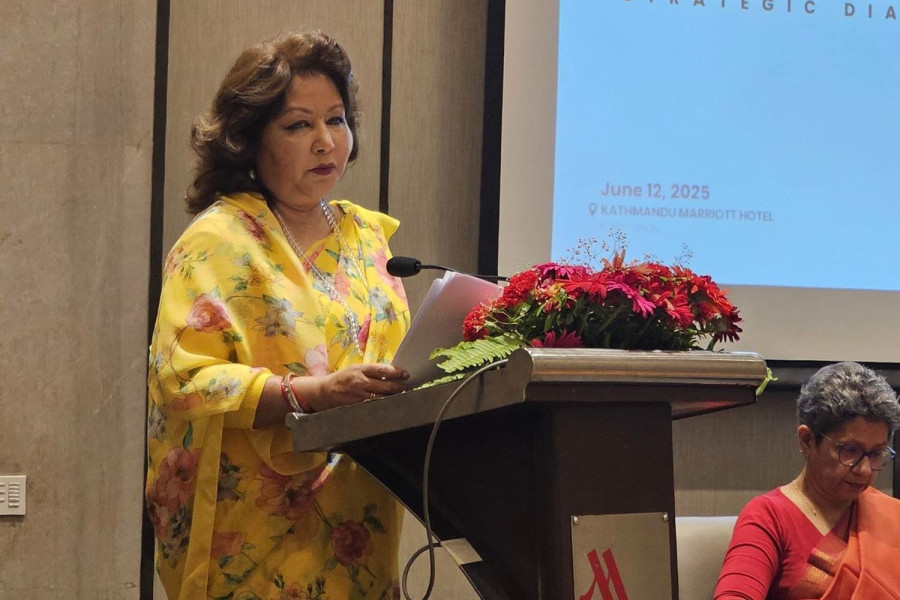National
Foreign Minister Deuba calls for boosting trade and seamless connectivity with India
Experts and diplomats call for greater cooperation in energy, digital innovation and regional security.
Post Report
Foreign Minister Arzu Rana Deuba has said that joint partnership and connectivity form the foundation for shared prosperity between Nepal and India.
Inaugurating the Nepal-India Strategic Dialogue in Kathmandu on Thursday, she called for speeding up cooperation in trade, transit and investment and for greater economic partnership through connectivity.
She also stated that the security of Nepal and India is interconnected and interlinked.
“I look forward to a future where ginger from Nepali farmers reaches the Mumbai market within 24 hours and an Indian tourist reaches Pokhara on an evening flight after finishing a morning meeting in Delhi. This kind of proximity should be the basis for economic prosperity for the citizens of the two countries.”
Referring to the ago-old Nepal-India relations, she said enhancing cooperation and connectivity would help shape a prosperous future for both countries.
She called for more investment in roads, railways, waterways, air routes, and digital infrastructure to boost mutual connectivity.
“Seamless connectivity between the two countries will not only support regional and global supply chains, but also enhance transit trade and border economies. This will benefit the citizens of both countries.”
Deuba also stressed the need for both countries to jointly focus their efforts on digital economy, technology and innovation, modern education, skill development and creative economy.
She said the energy sector stands out as a key area of cooperation and that Nepal’s vast hydropower potential will provide a clean, renewable energy source for generations to come.
She lauded India's pledge to import 10,000 MW of electricity from Nepal in the coming decade as part of Nepal-India energy cooperation. "The two countries have further strengthened cooperation in the power sector, including developing transmission interconnections, grid connectivity and power exchange, and cross-border power trade."
She also proposed collaboration between India's expertise in digital innovation and Nepal's young and tech-savvy population. "We should promote tech hubs, start-ups and digital innovation platforms in mutual cooperation and let our youth work together, use technology and move forward on the path of prosperity."
On climate change, she called for joint efforts and thanked the Indian government for its cooperation and support in the recent ‘Sagarmatha Sambad’ dialogue in Nepal.
Reiterating Nepal's commitment to peace, stability and prosperity through strong partnerships, she said strategic dialogues are vital for deepening relations, exchanging ideas, and strengthening people-to-people contacts.
Speaking in the event jointly organised by Centre for Social Innovation and Foreign Policy (CESIF) and India-based Ananta Aspen Centre, Indian envoy Naveen Srivastava emphasised the deep-rooted Nepal-India ties, citing efforts to boost institutional dialogue and expand collaboration across all sectors. He pointed to the Dakshin platform—a consortium of six key Nepali think tanks—as a new avenue for generating innovative ideas to strengthen the bilateral ties.
"India remains Nepal’s foremost development partner and largest source of FDI, with over 150 active ventures contributing significantly to Nepal’s economy," said the ambassador.
Amid growing concerns about regional security and terrorism, he said India is committed to working closely with Nepal to address cross-border challenges through shared understanding.
Ambassador Srivastava concluded by underlining that differences may arise, but they should never become disputes.
Speaking in the same event, former Indian foreign secretary and envoy to Nepal Shyam Saran acknowledged that although some challenges remain, Nepal-India relations are strong and reflect close economic and political ties.
The former envoy also stated that Nepal has the potential to become the richest country in South Asia by harnessing water resources, attracting tourists and opening investment in international schools, data centres, clean water, and clean energy, and artificial intelligence.
Sharan also stated that the proximity and closeness with India does not match China and people to people relationship and they are the great assets. He also urged to promote the civil society dialogue between Nepal and India and should engage the younger groups in the discourse.
Former chief secretary and foreign secretary Shankar Das Bairagi said that India offers ample opportunities for Nepal and the concept of being India-locked country is gradually being replaced.
Bairagi suggested charting out a long-term vision so that both sides can address difficulties through diplomacy.
“We should also respect the geography but the factors that define our relationship are different from those we share with others. We need to protect the sanctity of the border, work together in regional and international forums, and continue high-level contact, strategic dialogue,” said Bairagi.
The one day strategic dialogue brought together experts from Nepal and India who discussed various facets of Nepal, India ties among others.




 17.12°C Kathmandu
17.12°C Kathmandu













